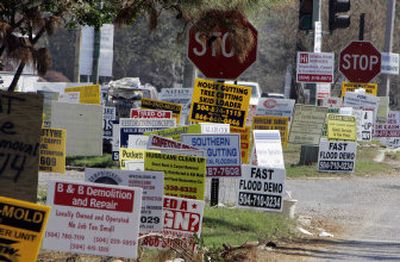Old legal idea could aid New Orleans

NEW ORLEANS – Officials and community advocates are quietly planting the seeds for an enterprising program that could give the government temporary control over thousands of privately owned homes decimated by Hurricane Katrina.
An increasing number of Louisiana housing authorities believe the proposal, which is based on an arcane legal concept called “usufruct,” could be a key to determining whether New Orleans will once again be a seminal American city or will stagnate with a population, like it has now, equal to that of Duluth, Minn., and Fort Smith, Ark.
Nearly two months after Katrina, the nation’s attention has shifted largely to the “old city” – the French Quarter, the Garden District – which was relatively unscathed and is showing considerable signs of life.
But New Orleans’ future will be decided elsewhere, in neighborhoods that, while they were rarely seen by tourists, were home to the bulk of the city’s residents. There, ravaged homes sit empty for miles on end, with no power, no water and no hint of recovery.
“The entire redevelopment of New Orleans rests on this issue,” said Mtumishi St. Julien, a longtime community advocate, a housing adviser to Mayor C. Ray Nagin and the executive director of the Finance Authority, one of the primary local agencies that administers government housing programs. “We have a lot of people who, through no fault of their own, do not have the capability to come home and fix up their property. So our greatest challenge in redeveloping is acquiring the land to rebuild.”
The proposal would require deft legal maneuvering and could be controversial, largely because the U.S. Constitution severely restricts the government’s ability to control private property. But New Orleans is attempting to recover from a catastrophe, St. Julien said, one that will require extraordinary steps.
St. Julien cautioned that the program would not be a “silver bullet,” but he said it could be a critical tool, among a spectrum of public initiatives, to recover the housing stock in New Orleans, repopulate the city and find housing for civil servants who make the city work.
“You are not going to rebuild New Orleans unless you are able to get government access to private property,” he said Saturday. “If government does not solve that problem, everything else is just talk. It is foolish to believe otherwise.”
Usufruct is a centuries-old legal concept that gives a person the right to use and profit from property that belongs to someone else.
In Louisiana – in a relic of the state’s unusual legal system, which is founded on Napoleonic code rather than English common law – usufruct can apply to private property rights. It is sometimes used here to give a husband or wife control over property after his or her spouse dies. In layman’s terms, proponents of the housing program want to give that control to the government.
The proposal is in its infancy and would require an act of the Legislature and a significant financial contribution – hundreds of millions of dollars, most likely – by the federal government. But after originating with a handful of New Orleans attorneys, the idea has swept through the offices of housing authorities and other government officials in Louisiana and on Capitol Hill and is gaining steam in many quarters.
The mechanics of the proposal remain uncertain but are beginning to come together. It would work like this:
Authorities would locate scattered homeowners to determine if they have the means or the inclination to rebuild. There are believed to be at least 100,000 homes in New Orleans that are damaged to the point that they are not currently habitable. If the owner is not planning to return anytime soon, local officials would strike a deal.
The owner would sign over controlling rights of the property – but not the title – to the government. In most cases, that would likely be the city of New Orleans, but the program would apply statewide and could involve numerous municipal or parish governments.
Through contracts targeting hundreds of properties at once, the government would then pay to make the home habitable again, while assuming, in most cases, mortgage payments for the owner.
The home would then be rented out, first to displaced “essential workers” such as teachers, police officers, firefighters and their families, then to the public. Rents would likely be subsidized, and checks would be written to the government agency that signed the deal or to a company hired to manage the money.
The owner would be allowed to return after an agreed-upon period of time – perhaps three to five years – provided he or she can repay the government for repairs made to the home. If, at that point, the owner does not want to return or cannot pay for the fixes, the government would have the right sell it. If the house were sold, the government and the owner could share in both profits and losses.
Because the government would not technically own the property, advocates believe the program would not represent a “taking” of homes, and could sidestep constitutional questions. For the same reasons, the program would not require costly and lengthy court battles that typically ensue when the government tries to seize a property through eminent domain.
The proposal has met with a welcome reception even among some politicians and officials who consider themselves advocates of private property rights.
“I would not want the city taking any liberties that did not involve the respect of private property rights,” said City Councilwoman Jacquelyn Brechtel Clarkson, who is also a veteran Realtor and a fierce proponent of those rights. “But if it’s a good plan, then it’s wonderful.”